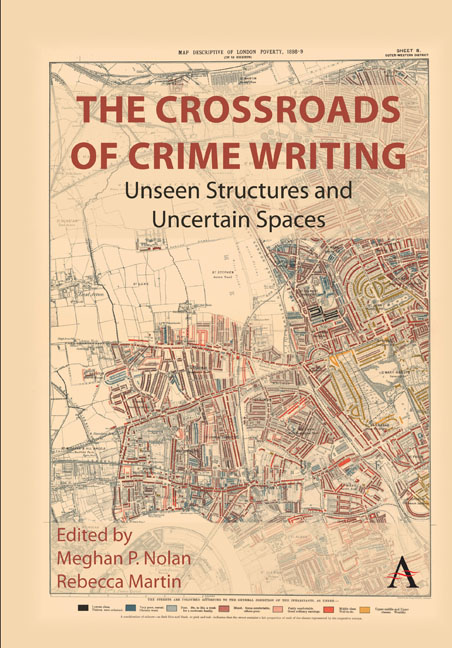Book contents
- Frontmatter
- Contents
- Introduction
- Unseen Structures
- Chapter 1 Unseen Structures and the Outlaw: Depictions of Violations in Stieg Larsson’s Millennium Trilogy
- Chapter 2 Dark Waters: Eco-Noir in New York 2140
- Chapter 3 Between Lenin and Sherlock Holmes: Soviet Militsiya Procedural in Volodymyr Kashin’s Detective Fiction
- Chapter 4 Detecting Justice: Black Crime Fiction and the Novels of Attica Locke
- Chapter 5 The Police and the Private Eye: The Making of Gendered and Racial Peripheralization in the Crime Fiction of Valerie Wilson Wesley
- Uncertain Spaces
- Chapter 6 Navigating the Carceral City: Calcutta in Late Nineteenth-Century Narratives of Detection
- Chapter 7 Traversing the Borders of Poverty and Morality: The Intersection of Maps and Upper-Class Ethics in Anne Perry’s Neo-Victorian Series
- Chapter 8 Facts and Fictions: The Liminal Space Between True Crime and Crime Fiction
- Chapter 9 The Success(Ion) and Corruption of Crime Genres in Jo Nesbø’s Macbeth (2018)
- Chapter 10 The Golden Age Meets the Age of Aquarius: Agatha Christie in the 1960s
- Notes on Editors and Contributors
- Permissions
- Index
Chapter 9 - The Success(Ion) and Corruption of Crime Genres in Jo Nesbø’s Macbeth (2018)
Published online by Cambridge University Press: 13 April 2024
- Frontmatter
- Contents
- Introduction
- Unseen Structures
- Chapter 1 Unseen Structures and the Outlaw: Depictions of Violations in Stieg Larsson’s Millennium Trilogy
- Chapter 2 Dark Waters: Eco-Noir in New York 2140
- Chapter 3 Between Lenin and Sherlock Holmes: Soviet Militsiya Procedural in Volodymyr Kashin’s Detective Fiction
- Chapter 4 Detecting Justice: Black Crime Fiction and the Novels of Attica Locke
- Chapter 5 The Police and the Private Eye: The Making of Gendered and Racial Peripheralization in the Crime Fiction of Valerie Wilson Wesley
- Uncertain Spaces
- Chapter 6 Navigating the Carceral City: Calcutta in Late Nineteenth-Century Narratives of Detection
- Chapter 7 Traversing the Borders of Poverty and Morality: The Intersection of Maps and Upper-Class Ethics in Anne Perry’s Neo-Victorian Series
- Chapter 8 Facts and Fictions: The Liminal Space Between True Crime and Crime Fiction
- Chapter 9 The Success(Ion) and Corruption of Crime Genres in Jo Nesbø’s Macbeth (2018)
- Chapter 10 The Golden Age Meets the Age of Aquarius: Agatha Christie in the 1960s
- Notes on Editors and Contributors
- Permissions
- Index
Summary
Introduction
William Shakespeare is one of the few authors in the world who have gained the privilege of beginning their work by means of a question when this is too often considered a testament to bad style. His tragedy Macbeth (c. 1606) opens with the first witch asking, “When shall we three meet again? In thunder, lighting, or in rain?” instigating a play which continuously poses new questions, rather than presenting a clear-cut moral compass that leads its audience to the road of individual redemption. This opening question symbolizes the omnipresence of paradoxes which infiltrate the entirety of the play, in this case, that neither of the tempestuous phenomena to which the witch alludes here would normally appear in complete isolation. Right from the outset, Shakespeare denies any certainties in the dramatic world of Macbeth. Elena Ciobanu notably writes that
[a]mbiguity permeates the play at all levels: it is not only the world of the witches that is elusive, but also, and most significantly so, the world of the humans, whose perceptions, judgments and decisions are continuously subverted by unsolvable instability and tension. (2020, 33)
However, rather than framing this ambiguity as logical waste, it also carries with it its own counterpart, namely a productive understanding of early modern mentalities and the move from the Middle Ages to the early modern age (cf. Gaskill 2000). Following Malcom Gaskill's argument that one should refrain from capturing the ideas of the early modern mind statically, as if ideas and mentalities were inactive, and his alternative is turning toward investigating “interactions between discourses and historical actors participating in them” (2000, 16), this chapter explores how the conceptual flexibility of the early modern mentalities is used by Jo Nesbø's 2018 adaptation Macbeth to rewrite Shakespeare's tragedy into a twenty-first-century tale of crime, drugs, and corruption. The notion of “cultural memory,” as used by Astrid Erll, offers itself here well to identify the historical and conceptual contexts which are subsequently referred to by the novel, that is national, temporal, or genre boundaries, since cultural memory studies as a field of research defines itself “by the transcending of boundaries” (Erll 2008, 4).
- Type
- Chapter
- Information
- The Crossroads of Crime WritingUnseen Structures and Uncertain Spaces, pp. 191 - 208Publisher: Anthem PressPrint publication year: 2024



